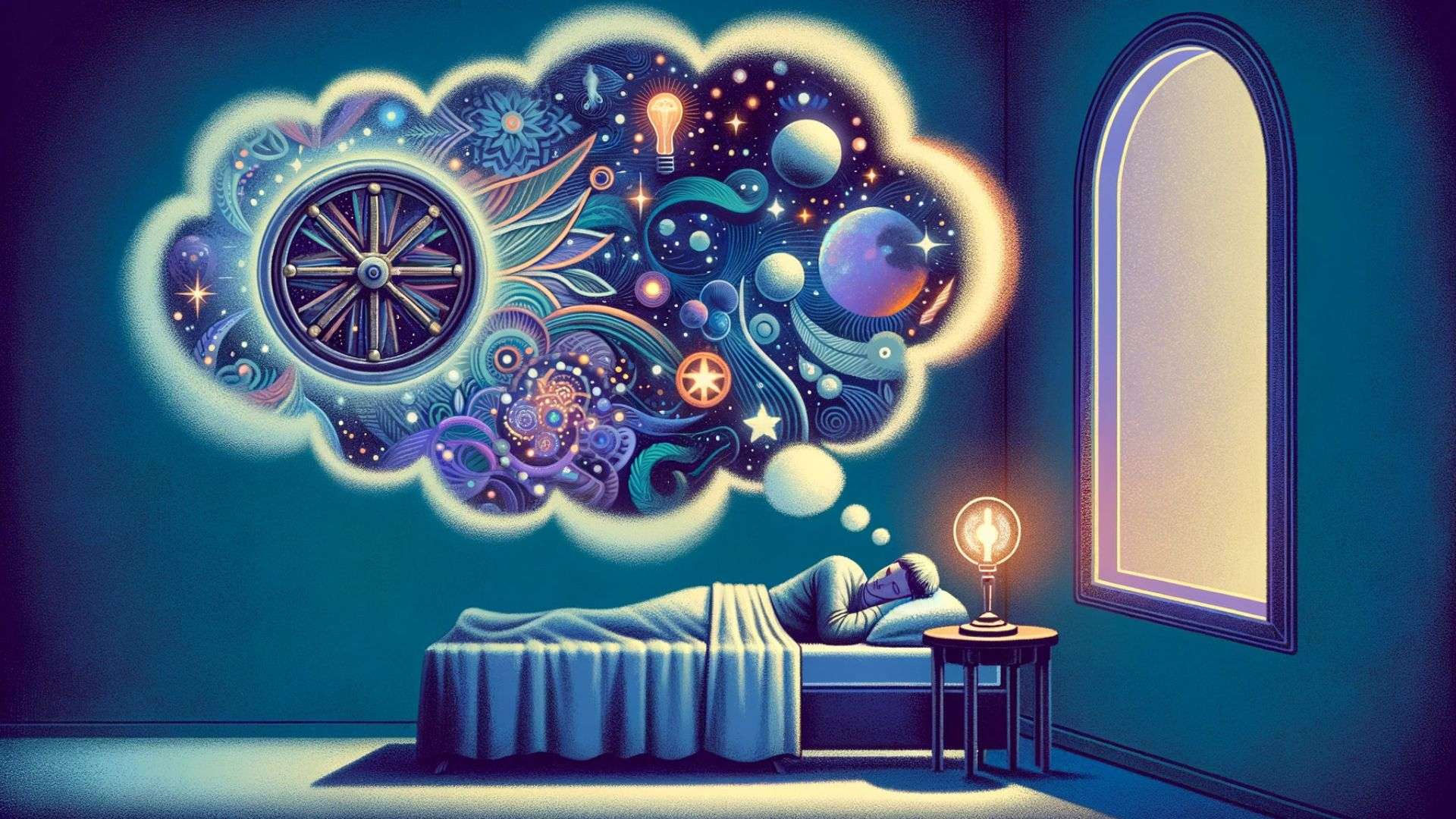Can Lucid Dreams Be Caused by Stress? Discover the Link
Some of our posts on Dreamtold.com contain affiliate links. If you click on an affiliate link and make a purchase, we may receive a commission. Clicking on an affiliate link that earns a commission does NOT result in additional charges or costs you extra. Earnings from affiliate links help keep this website running. See our full affiliate disclosure here.
Lucid dreaming is a fascinating phenomenon that has captured people’s imagination for centuries. In a lucid dream, the dreamer becomes aware they are dreaming during the dream itself. With this awareness comes the potential ability to exert control over the dream – almost like directing your own movie while you sleep.
In recent years, lucid dreaming has gained more mainstream recognition. Blockbuster movies like Inception have sparked public interest in the practice. At the same time, new research is shedding light on the possible causes and therapeutic benefits of lucid dreams.
One area scientists are exploring is the link between lucid dreams and stress. Can disrupted sleep cycles, traumatic events, and anxiety trigger more frequent and vivid lucid dreams? Read on to learn what the latest research reveals about the connection between lucid dreaming and stress.
Key Takeaways
- Lucid dreaming is when you become aware that you are dreaming during the actual dream. This awareness allows varying control over the dream narrative.
- Lucid dreams predominantly occur during REM sleep towards the end of a sleep cycle. About 55-70% of people experience at least one lucid dream in their lives.
- Disrupted REM sleep cycles caused by stress, anxiety, medications, or other factors can potentially trigger spontaneous lucid dreams.
- Studies demonstrate links between stress, emotions, and sleep. Fluctuating cortisol and adrenaline levels affect REM sleep and dreaming.
- People with anxiety, depression, PTSD, and related conditions often experience more negative, vivid dreams and nightmares.
- Lucid dreaming may have psychological benefits for some people, including confronting fears and trauma. However, more research is still needed.
- Downsides of lucid dreaming could include disrupted sleep, blurring the line between dreams and reality, and dissociative tendencies in certain groups.
- Tackling the root causes of stress through lifestyle changes, therapy, adjusting medications, and healthy sleep habits can reduce vivid dreams.
- While more research is needed, lucid dreaming holds exciting potential for exploring emotions, enhancing confidence, and improving mental health when applied in moderation.

What is Lucid Dreaming?
Before diving into the possible stress-related causes, let’s cover some lucid dreaming basics.
A lucid dream is a dream where the dreamer is aware they are dreaming during the actual dream. This is in contrast to a regular dream, where the dreamer is completely absorbed in the dream and believes everything happening is real.
In a lucid dream, the dreamer retains access to waking memories and consciousness. This awareness that you are dreaming can give you the ability to control or manipulate the dream to some degree.
Imagine realizing you can take flight and soar above breathtaking landscapes, or revisit cherished memories by conjuring up loved ones who have passed. Lucid dreamers report these types of vivid experiences along with profound feelings of exhilaration.
However, not all lucid dreams are pleasant journeys. They can sometimes bring up intense emotions or frightening imagery from nightmares.
Lucid dreaming predominantly takes place during rapid eye movement (REM) sleep. REM sleep is an active phase of sleep marked by quicker breathing, increased brain activity, and of course, rapid eye movements.
Table 1: Common Triggers of Lucid Dreams
| Trigger | Explanation | Impact on Sleep & Dreaming |
| Sleep Deprivation | Not getting adequate sleep duration or quality | REM sleep rebound causes vivid dreams |
| Medication Side Effects | Antidepressants, blood pressure meds, Parkinson’s meds | Alter sleep architecture and neurochemistry |
| Withdrawing from Substances | Detoxing from alcohol, opioids, marijuana etc. | REM rebound after substance suppresses REM sleep |
| Narcolepsy | Disorder causing irresistible sleep attacks | Enters REM almost instantly after falling asleep |
| Major Life Changes | Pregnancy, new job, moving, divorce, etc. | Stress disrupts sleep cycles |
| Traumatic Events | Abuse, violence, disasters, grief/loss | Stress influences sleep and dreaming |
Lucid dreams tend to happen in longer REM cycles towards the end of a night’s sleep. The first REM cycle of the night is relatively short, only lasting several minutes. But progressively, each REM phase gets longer. The final REM phase before waking may last up to an hour.
Scientists estimate that around 55-70% of people experience at least one lucid dream in their lifetime. However, frequent lucid dreaming is rare. Only about 20-30% of people regularly have lucid dreams, typically defined as at least once a month. An even smaller number – about 1% – claim to have them several times a week.
Now that we’ve defined what lucid dreaming is, let’s explore how stress and anxiety may play a role in triggering these vivid dreams.

Can Stress and Anxiety Cause Lucid Dreams?
The causes behind lucid dreams are still shrouded in mystery. However, various studies propose links between lucid dreaming and stress.
Since lucid dreams predominantly happen during REM sleep, anything that disrupts normal REM cycles could make lucid dreams more likely. Stress and emotional trauma are two factors that can profoundly impact sleep.
Table 2: Brain Activity Differences in Lucid vs Normal Dreams
| Brain Area | Normal REM Dreaming | Lucid Dreaming |
| Prefrontal Cortex | Low activity | High activity |
| Limbic System | High activity | Lower activity |
| Basal Ganglia | Low activity | High activity |
| Parietal Lobes | Low activity | High activity |
Let’s take a look at some of the potential stress-related triggers of lucid dreams:
Sleep Deprivation
Not getting enough sleep is a huge source of stress for the body and brain. Sleep deprivation directly reduces REM sleep, which is key for dreaming. When you finally do get a longer stretch of sleep, you spend more time in REM, often dreaming more intensely.
This REM rebound after sleep deprivation often causes vivid dreams and nightmares. Researchers think disrupted REM cycles like this may also encourage spontaneous lucid dreaming. As evidence, one study found that forced awakenings during REM sleep increased lucid dream frequency.
Anxiety and Trauma
Anxiety and traumatic events are closely linked to vivid, emotionally intense dreams and nightmares. Studies consistently show people suffering from anxiety, depression, and PTSD are far more likely to have frequent, bizarre nightmares.
The emotions and memories from waking life carry over into dreams, especially during REM sleep when the brain is active and processing information.
Some experts think lucid dreams may arise as a way for the unconscious mind to confront and process traumatic memories in a safer dreamscape. Through lucid dreaming, someone with PTSD could potentially gain control over a nightmare and actively reshape a terrifying memory.
However, not all research supports this idea. A pilot study testing lucid dreaming therapy on PTSD patients found it did not relieve anxiety and depression symptoms more than a control group. More research is still needed around the psychological effects of controlling traumatic nightmares through lucid dreaming.
Substance Use Disorders
Using recreational substances like alcohol, marijuana, and prescription drugs alters normal REM sleep patterns. Stopping substance use can lead to REM sleep rebound, vivid dreams, and possible lucid dreams. This may explain why recovering addicts often report extremely vivid dreams and nightmares when detoxing from drugs and alcohol.
Narcolepsy
Narcolepsy is a sleep disorder causing extreme daytime sleepiness and sudden, irresistible sleep attacks. A major symptom of narcolepsy involves cataplexy – sudden loss of muscle tone triggered by emotions. Narcolepsy is linked to abnormal REM cycles.
People with narcolepsy tend to quickly enter into REM sleep, within 15 minutes or less. This may explain why many report frequent vivid dreams and lucid dreams. The REM/wake brain activity blend of narcolepsy also makes lucid dreaming more likely.
Certain Medications
Some prescription medications list vivid or strange dreams as a side effect. Medicines including antidepressants, blood pressure drugs, Parkinson’s disease medications, and more can impact sleep architecture and dreaming.
However, links between specific drugs and lucid dreaming frequency need further study. Talk to your doctor if you feel medications are causing vivid dreams or nightmares. They may be able to adjust the dosage or try an alternative medication.
Significant Life Changes
High-stress life events can understandably impact someone’s dreams and sleep quality. Common major triggers include pregnancy and childbirth, changing jobs or homes, relationship conflicts, exams, quarrels, and sudden losses.
Trying to process these changes likely explains related sleep disruptions and intense dreams. If possible, managing the stress of major transitions with self-care can help improve sleep. Significant life changes may spark temporary lucid dreams, but these often fade once the event passes.
The next section explores the science behind stress and emotions impacting dreams and sleep in more detail.

The Link Between Stress, Emotions and Dreams
Stress is complex and can stem from countless sources. When we feel pushed beyond our limits, both physically and mentally, it triggers a physiological stress response. The body releases a flood of hormones like cortisol and adrenaline.
These stress hormones and neurotransmitters can profoundly impact sleep cycles and the dreaming brain. Emotions also alter brain activity, heart rate, hormones, and more, adding another layer of influence.
Let’s examine some of the key scientific links between stress, emotions, and dreams:
- Stress hormones like cortisol directly impact REM sleep. Studies demonstrate that both high and low cortisol levels can significantly reduce REM sleep time. This inhibits memory processing and emotional regulation normally handled by dreaming.
- Sleep deprivation caused by stress reduces REM sleep time. Without adequate REM sleep, we experience REM rebound on the following nights. This often intensifies dreams and disrupts normal sleep architecture.
- Stress and negative emotions exponentially increase dream recall. In stressful times, the content of dreams tends to reflect waking anxieties. The intense emotions make negative dreams much more memorable.
- Emotional centers of the brain are highly active during REM sleep. Increased activity in the limbic system and amygdala may spark emotional dreams and fears. However, dreams also help process emotions to reduce their intensity.
- Brain activity and neurochemistry differs during lucid vs. regular dreaming. fMRI scans show the prefrontal cortex is much more active during lucid dreams compared to REM sleep. The brain is in a hybrid conscious-unconscious state.
Overall, research clearly demonstrates strong links between stress, emotions, and sleep. However, the precise impact this has on triggering lucid dreams or signs of dreaming still requires more study.
Next, we’ll go over some of the psychological and therapeutic aspects of lucid dreams related to stress and trauma.
Table 3: Pros vs Cons of Lucid Dreaming
| Potential Benefits | Potential Risks |
| Confront fears and trauma | Disrupt sleep cycles |
| Boost confidence | Worsen dissociation |
| Rehearse skills | Lead to addiction or escapism |
| Creativity and inspiration | Overwhelming unconscious material |
| Explore consciousness | Confuse dreams with reality |

Lucid Dreaming for Stress Relief and Psychological Healing
Beyond the science, many people deliberately cultivate lucid dreaming to help relieve stress and work through emotional issues. The level of dream control possible in a lucid state creates potential therapeutic applications.
Although research in this area is limited, some studies propose lucid dreaming could provide psychological healing benefits:
- Confronting trauma: Lucid dreams could potentially help trauma survivors safely face and process distressing memories through dream re-scripting. However, results are mixed on whether this reduces PTSD symptoms.
- Regaining confidence: Flying, public speaking, and other fear challenges can be practiced in a lucid dream to build confidence for real-world situations.
- Boosting mental health: Some experiments found that achieving dream control over nightmares improved mood and decreased anxiety and depression. But not all studies confirm this effect.
- Rehearsing skills: Lucid practice of sports, music, languages, and other skills showed minor improvements in waking performance. Boosts were not significant but do show the possibilities.
- Overcoming addictions: A pilot Quit Smoking study used lucid dreaming to rehearse refusing cigarettes. Results suggested this mental practice could potentially help beat cravings.
Again, most of these psychological applications require a great deal more research. However, the overall ability to consciously face anxieties, fears, and memories may have a cathartic effect for some.

Potential Downsides and Risks of Lucid Dreaming
While the benefits are exciting, it’s important to address the potential downsides of lucid dreaming too. Some concerns and considerations include:
- Disrupted sleep: Lucid dreaming could impair sleep quality and daytime energy if it causes too much stimulation or awakening. However, most research found no negative impact on sleep depth or duration.
- Unconscious material: Attempts to confront trauma could lead to unexpectedly intense, overwhelming emotions when the unconscious mind takes over. But for some experienced lucid dreamers, this release is ultimately therapeutic.
- Derealization: Blurring the line between dreams and reality too often could potentially worsen dissociation issues. Naturally occurring lucid dreams don’t seem to increase this risk.
- Addiction: Overusing lucid dreaming to escape or dissociate from problems could form an unhealthy dissociative habit. But this would likely only occur in those already struggling with dissociative disorders.
- Assertiveness issues: Shy individuals who become very assertive in lucid dreams could feel disappointed or frustrated with waking passivity and anxiety. But the confidence boost tends to carry over somewhat into waking life.
The risks of naturally-occurring lucid dreams appear negligible for most of the population. However, certain groups should exercise caution with deliberately inducing lucid dreams frequently. This includes people with severe mental illness, PTSD, epilepsy, or dissociative disorders.
Overall, the evidence supports lucid dreaming as an intriguing state that could provide psychological healing for some. Like any inner exploration, it requires treading carefully and staying alert to any unhealthy patterns that arise.

Tips For Reducing Stress-Related Vivid Dreams and Nightmares
If your vivid dreams or nightmares seem related to stressful situations, the best solution is tackling the underlying stress itself through healthy coping techniques like:
- Establishing an earlier, more consistent bedtime routine
- Getting regular exercise to reduce cortisol
- Practicing meditation, mindfulness and gratitude
- Spending time in nature and sunlight
- Reaching out for social support
- Exploring therapy and counseling
- Avoiding stimulants in the evenings
- Cutting back on screen time before bed
- Keeping a dream journal to process emotions
For vivid dreams possibly related to medication side effects or substance withdrawals, talk to your doctor about adjusting dosages or alternative treatment. They may also recommend supplementing with magnesium, calcium, B vitamins, melatonin, or herbal remedies.
If nightmares are occurring, you can also try imagery rehearsal therapy. This involves writing down the nightmare, changing it any way you wish, and rehearsing the new dream scenario as you fall asleep. The technique aims to overwrite the bad dream with a more positive version.
Finally, consider general lucid dreaming induction techniques if you want to gently explore achieving lucidity, such as:
- Mnemonic Induction of Lucid Dreams (MILD): Affirming intention to lucid dream as you fall asleep
- Wake Back to Bed: Wake yourself about 90 minutes before normal, stay awake briefly, then return to sleep
- Reality testing: Frequently questioning your state during the day, which can lead to realizing you’re dreaming at night. Common reality checks include trying to float, poking fingers through your palm, or flipping a light switch.
However, take care not to over-disrupt your sleep or become dependent on lucid dreaming. Overall, getting adequate restorative sleep is the best way to reduce chronic nightmares and vivid dreams. Healthy dreaming patterns will naturally follow.
Final Thoughts
Research clearly shows connections between stress and vivid, emotional dreams and nightmares. While the precise mechanisms are still not fully understood, fluctuations in hormones and neurotransmitters, as well as disrupted sleep cycles, appear to play pivotal roles.
Traumatic events and mental illnesses involving high anxiety frequently correlate with more intense dream recall. Lucid dreams also tend to arise during periods of REM sleep instability.
While lucid dreaming shows therapeutic potential in some cases, over-reliance could also create issues around sleep quality, dissociation, or escapism.
However, gently experimenting with lucid dreaming could provide exciting opportunities to safely confront stressful emotions, memories, fears, and anxieties through the unconscious landscape of dreams.
Overall, stress-related lucid dreams appear more likely to be transient side effects that come and go. If vivid dreaming persists, addressing the underlying causes through healthy lifestyle changes and coping skills can help restore peaceful sleep.
Frequently Asked Questions Related to Can Lucid Dreams Be Caused By Stress

Hi, I’m Cal Hewitt, the founder of Dream Told. After battling insomnia for over 30 years, I’ve dedicated myself to helping others find natural, practical solutions for better sleep. Through extensive research and personal experience, I share insights on how to improve your sleep quality, from creating the right environment to using external tools like binaural audio. My goal is to educate, inspire, and provide real solutions for anyone looking to get more restful sleep. Explore more about my journey and how Dream Told can help you by visiting my full story below.





